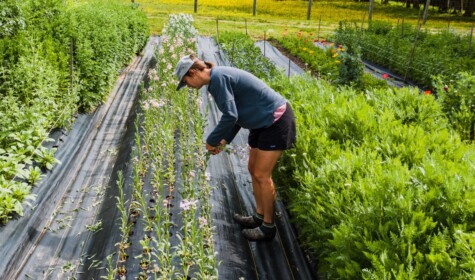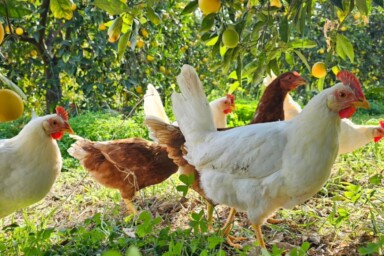Today, the British horticulture sector finds itself in an increasingly precarious situation with major labour shortages, cost increases on almost every front (transportation, packaging, energy) and more and more unpredictable weather as a result of climate change. At a time when British horticulture should be expanding, many growers are choosing to reduce their acreage or shorten their growing season, risking further declines. If the UK’s food security, public health and climate change issues are to be addressed seriously, policymakers cannot overlook the need to dramatically shift both production and consumption.
Professor Tim Lang in his book Feeding Britain: Our Food Problems and How to Fix Them, remarks that in the late 20th century, the UK had a renowned and profitable horticulture sector, but it was allowed to deteriorate, and between 2005 and 2015, an estimated 33,500 small to medium enterprises (SMEs) went out of business. The UK Government’s focus and private investment have tended to concentrate on developing agri-tech to reduce labour demand, and scaling up farms to increase productivity – a theme that has been coupled with the impact of strong market forces and reduced trade and environmental regulation. As a result, the horticulture sector has become extremely consolidated at the expense of small to medium enterprises and small-scale growers, undermining their contribution to food security, public health and the local economy.
Economic and socio-ecological benefits of small-scale growers
Recent research has shown how small-scale growers increase their fruit and vegetable intake, physical activity, exposure to nature and social cohesiveness while also contributing to local food security and producing sustainable healthy food. The Landworkers’ Alliance find that small to medium enterprises can be equally, if not more productive and financially viable than conventional larger farms. And further, one study found that the horticultural production potential of urban green spaces across the UK’s towns and cities offered a significant opportunity to increase the UK’s self-sufficiency in fruit and vegetables whilst also stimulating the local economy.
In 2021, a study in Wales discovered that amid the COVID-19 crisis, the demand for regional food grew substantially and growers experienced a sudden and dramatic demand for fruit and vegetables based on comparison with expected trade for the time of year. There was strong consensus from research participants that Welsh growers are willing and ready to increase production should high levels of demand persist. However, producers voiced disappointment that this was undervalued by decision-makers, who they believed had failed to invest in the industry or acknowledge its socio-ecological significance. As a result, the agreement was that Welsh horticulture could scale up output if government provided capital grants or loans to invest in site development and infrastructure.
What are the major challenges small-scale growers face?
Studying small-scale growers, I found that access to affordable housing, land to grow on and capital grants were specific challenges, as was the lack of legal agreements. While these were significant challenges for current growers, they were also a significant barrier for entrants. Small-scale growers often fall below the ‘five hectare’ policy and therefore haven’t previously received subsidies or any government support.
Growers were also angry at the government’s failure to respond to the lack of labour for the commercial sector, and further highlighted its inability to generate domestic labour. A recent study in Wales showed that food education and training is very scarce, notably in horticulture, and there is a gap in horticultural training, with many prospective producers unaware of the full range of opportunities accessible to them. Farming groups argue the sector needs to be made an attractive career route for young people, where wages are strong, work is valued and there are progression opportunities.
Another challenge for small-scale growers is the rise of supermarkets and finding alternative routes to stable and financially viable markets. Today, the majority of fruit and vegetables are sold in supermarkets and supply chains are characterised by substantial power imbalances that favour supermarkets and their preferred lead suppliers. Their changes and demands have put thousands of small-scale producers out of business and placed enormous pressure on large-scale commercial growers to produce efficiently and at scale.
What support is needed most right now for small-scale growers?
Supporting young people through training and creating opportunities for growth and higher-skilled jobs in the sector is paramount in rebuilding and supporting British horticulture. Participants agreed that better training opportunities and access to earlier and higher education in horticulture were extremely important in helping to rebuild the sector and ensure its sustainability. Participants suggested that schools must start championing food production from a young age and agricultural colleges need to be more accessible to young people and differing groups of society. The NFU’s ‘New Entrant Support Scheme’ (2022) sets out a clear plan on how to do this and it is highly commendable. The LWA’s ‘Attraction of Agroecology’ (2022) also demonstrates how to overcome barriers and help young people into the sector. Both of these reports have been clear that whilst short-term labour demand could be met through the Seasonal Worker Scheme, encouraging young people into the sector is vital.
To capitalise on this potential, the Horticulture Strategy for England (HSFE) needs to centre on labour, sustainability, profitability and resilience. By emphasising horticultural career opportunities focused on sustainability and resilience, the HSFE must successfully engage a new generation of growers who are attracted to agroecological and commercial horticulture. This will require investment and a cultural shift in the idea of agricultural work. The HSFE must ensure the sector has access to the labour it needs now, while also developing a long-term strategy to recruit and train the workers and entrepreneurs of the future. The strategy must be reinforced by funding, legislation and political will in order for action to begin immediately.
Prospective small-scale growers need easier access to affordable land (and accommodation nearby), grants for everyday capital and planning policies to support their endeavours. In a comparable Welsh study, small-scale growers emphasised that expansion is only possible with more investment in infrastructure, land and cooperation by national and local governments. Small and medium-sized enterprises lack funds to expand and obtaining financing is especially challenging for those operating on rented land. Some operate close to the limits of economic sustainability and cannot afford to employ additional skilled workers or invest in new equipment or infrastructure.
In South Wales, a new project is getting started called ‘Our Food 1200’. A locally managed community benefit society, ‘Our Food 1200 / Ein Bwyd 1200’, is launching a strategy to revive the local food industry in Monmouthshire and the Brecon Beacons. ‘Our Food 1200’ is searching for farmers and landowners with small plots of land suited for growing fruit and vegetables for local sale in Monmouthshire and the Brecon Beacons. The project’s 10-year goal is to establish a network of small-scale regenerative growers servicing local communities on 3-5-acre plots. A total of 1200 acres is being sought; it would only take that much land to produce enough seasonal fruit and vegetables for every household in the region. This form of farming creates around one job per acre, thus they hope to create at least 1200 jobs. The produce, supplied locally through box schemes and other channels, would create a new local food economy, maintaining earnings in the community and minimising food miles.
National and local government needs to recognise the considerable contribution small-scale growers make to UK food security through providing healthy and sustainable diets and boosting local employment. The findings demonstrate that UK-wide small-scale horticulture could scale up output if the government provided capital grants or loans to invest in site development and infrastructure. Moreover, policymakers should both protect allotments within cities and embed urban agricultural land within future developments to improve local food security. Strengthening public procurement rules presents a significant opportunity to support and provide a secure market for domestic producers whilst also providing high-quality local food to public institutions. Food system scholars suggest that public procurement could help create positive feedback loops in the food system for public health, the environment and rural employment.
While challenges remain for horticulture in the UK, there is increasing interest and emphasis on expanding UK edible horticulture. This is seen in government, industry investment and on a local level. All recognise the enormous benefits that could be realised if the UK produced more fruit and vegetables. Small-scale growers have a significant opportunity for scaling up output while also providing health, economic and environmental benefits. While numerous challenges remain, they are gradually being identified and overcome. The learning from projects like ‘Our Food 1200’ is extremely valuable and offers a great example of what we can achieve when we all work together.
Our Feeding Britain report finds that switching to sustainable farming methods could support the UK to double its production of fruit and vegetables. You can read the full report and our recently released summary report here.






